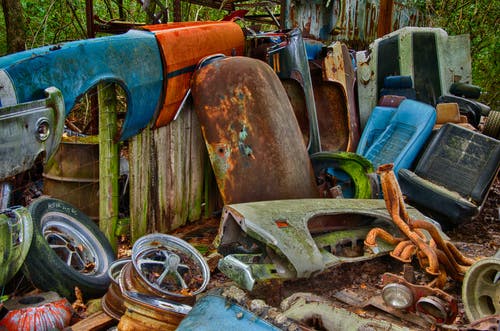Do you have an old piano that doesn’t play, but you don’t want to keep it either?
Do you wish there was some way to get rid of it and get a profit too?
Most people resort to scrapping the instrument, but does a piano have any scrap value?
A lot of people indeed have the knack for collecting vintage instruments.
If it’s not valuable or vintage enough to auction, you can always scrap to get a profit out of it.
For that, there are a few things that you should know and remember.
Let’s take a more in-depth look into it.
What Does Scrap Value Mean?

If scrapping is an entirely new concept for you and you have no idea what it means, here’s some basic information:
The scrap value of an instrument, a piano, in this case, is how much its physical assets are worth.
In other words, it determines how valuable the individual components of your piano are and whether you can resell them for a reasonable price.
When an instrument is no longer functional and usable for the owner, it doesn’t mean that the individual components are worthless.
Sometimes, only a single asset is the cause of the problem and is unusable.
The rest of the parts are okay, functional, and resalable.
The scrap value of an instrument doesn’t depend on how old or how usable it is.
Instead, it depends on the demand and importance of the materials that your tool comprises.
Are they valuable?
Are they expensive?
All of such questions play a significant role in determining the scrap value of a product.
The higher the demand, the larger the scrap value.
Another way to calculate and this value is by subtracting the total depreciation from the asset’s cost.
Using this formula will give you a quick average idea of what your instrument might be worth.
Sometimes, people refer to scrap value as residual value, salvage value, and break-up value.
Thus, know that all of these terms mean the same thing.
Related: Here is an article I wrote on whether a piano can be stored in a garage?
Does A Piano Have Any Scrap Value?
Now that you know what an instrument’s scrap value is let’s talk about your old, unusable piano.
Does your piano have any scrap value at all?
If yes, how much?
Remember, pianos are machines.
Thus, naturally, they mainly consist of metal, strings, and wood.
Whether your instrument has a scrap value depends on these three major components.
- Wood and Metal
As discussed earlier, the more the demand, the higher the scrap value.
The wood of your piano doesn’t have a lot of resale profit.
Similarly, the metal components of the instrument aren’t very in-demand either.
The scrappers usually don’t accept it.
Even if they do, the metal could be worth $30 to $50 at max for the entire piano.
- The Keys
The ivory keys and tops give a lot of people false hope.
Since it’s illegal to purchase or sell ivory in many parts of the world, many people assume that a piano’s keys might have a lot of value and demand in the international market.
That, however, is far from reality.
The piano keytops have very little raw ivory in them.
They’re prone to discoloration and breakage since they’re very brittle.
Plus, stores, technicians, and tuners already have an abundance of these keys from the free, useless instruments they receive.
Thus, keeping your hopes high for the ivory keys is a wastage of time.
- The Strings
Lastly, strings can be tricky.
Piano strings are prone to rust.
It means that, if not cared for, they might get ruined over time.
If such is the case, your strings will be of no value for scrapping.
Interestingly, brass strings have a higher value in the market.
They have a better resale price because of all the labor involved in manufacturing them and the fact that they don’t rust.
However, it would still be impractical to expect hundreds of dollars in return for brass.
Note: remember that tackling strings can be tricky.
If you’re scrapping the piano, ask a professional to take care of the strings for you.
If they snap, they’ll damage themselves and possibly injure you too.
How Much Can You Get By Scrapping A Piano?
While it is hard to give an exact amount, it would be fair to expect an average of $80 to $200 for scrapping a piano.
Remember, this is only an average, and you might be able to make more or less than these values.
It depends on the piano’s condition and its components.
If the instrument looks good and has brass strings, you might make a few more bucks than a rusty, scratched, unappealing instrument.
Plus, the kind of scrapper you find significantly impacts how much you can make out of it.
Some people can get quite lucky!
What Else Could You Do With An Old Piano?
If your piano doesn’t have a scrap value and you don’t want to throw it away for free, don’t worry.
There are a bunch of other ways that you can creatively use your beautiful instrument for other purposes.
Here are a few ideas to spark your innovative skills and abilities:
- Turn it into a piano tool bench or a piano front desk
- Create a piano minibar out of it
- Build a piano computer desk for your study
- Plant herbs and spices on your instrument and turn it into a majestic planter
- Cover it with glass and create a coffee table
- Attack the keys and different parts along your staircase
- Create a wall hanging and shelf out of the keyboard
- Use it as a garden ornament and even as a waterfall
In Conclusion
Overall, a piano doesn’t have a lot of scrap value.
If you find an enthusiast who likes to collect old pianos or its pieces, you might get lucky.
However, in the general market, it’ll be hard to find a suitable buyer for your old instrument.
The strings hold the most value and, if they’re in good condition, they may help you get a few good bucks.
But as far as the keys, the wood, and the rest of the instrument’s concerned, there’s not much you can expect.

I need to Scrap my piano it just sitting in my dining room 10yrs nobody playing it anything
I need to get my piano removed it just sitting in my
Same here + 1 in the garage. These are the old 48 inch high uprights. I looked up a few videos on disassembly and went that route. Took the one apart right in the living room. Was able to it without much mess. Took about 5 hours.
The 2nd one in the garage was about 4 hours. I knew a little more, and didn’t need to be as careful mess wise.
LOOSENING THE STRINGS BEFORE CUTTING IS A MUST!!
This is very helpful! Thanks for the time, energy and knowledge that went into this. Now to Google “how to loosen the strings before cutting”. Thanks.